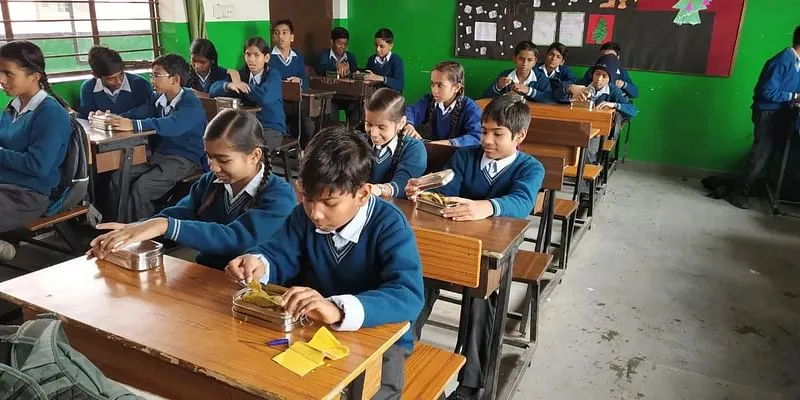Foodshaala is bringing the concept of healthy eating to low income households
Started by husband-wife duo, Raadhika and Amit Gupta, Foodshaala Foundation aims to empower communities with healthy and nutritious food.
Even in 2022, a large population in India is devoid of healthy and nutritious food.
Is ‘healthy eating’ a concept that applies only to the fortunate class? Raadhika Gupta, a lawyer and a Harvard Law School graduate, went in search of an answer in 2018.
“What motivated me was this thought that even though there is all this development in the world, food and nutrition, which is like the most basic human need, is still unmet for millions of people. And this is something which is really unacceptable in today's world. It was around 2017-18 and I didn't know what exactly to do,” she says. Raadhika adds that she used to volunteer at NGOs and food distribution organisations.

Raadhika and Amit interacting with women from Nathupur Village in Gurugram as part of their awareness campaigns
For 10+ years, Vitamin Angels is helping underserved in India's fight against malnutrition
With her husband, Amit Gupta, a former ‘Teach For India’ fellow, she decided to launch the . Fast forward to 2022, the foundation has provided access to a large number of people from low-income communities through community kitchens.
The Foodshaala team has also focussed heavily on spreading awareness among children about health and nutrition. Thanks to their efforts, sprouts and the fruits have made it to the plate of many children from the marginalised sections of our society.
Why Foodshaala?
While working with Teach for India, Amit understood that the problem of junk food consumption is also very much prevalent in our communities. For decades, children used to spend money on buying food from stores which usually comprises items like different chips and burgers.
“And then I realised that there were two major reasons for it. The first is the lack of availability of healthy food. If one goes out in the community, they are only used to finding all these unhealthy food options,” he says.
“The other issue was that there was no awareness among children, even among parents about why they should eat healthy and why food is an important element for their growth, and personal development,” Amit explains.
Starting up
To begin with, the duo went on field visits, and spoke to the children, parents, and teachers to understand the problem that the people are facing when it comes to food and nutrition.
“To tackle the problem, the first idea that we had was to set up community kitchens, where local people were employed and trained to prepare healthy meals. And we will sell it at affordable prices within the community to create a community based structure, providing access to healthy meals to school children, and then it could later develop to have more awareness and so on. So that is how it really started around October 2018,” says Raadhika.

From one of the community kitchens
However, the community kitchens came to a halt after the pandemic as the schools were shut. Even when schools started reopening, midday meals were not allowed. But during the course, the duo realised that it is the best time to create awareness and empower people about nutritious and healthy food within their homes within their budget.
“It's very important to bring a chain in the kitchen. Because if we supply the meal then it's not a permanent solution. At the end of the day, when they go back home, they again consume the same junk food or they don't eat at all as the nutrition is something which they totally ignore. So it's very important to empower them so that they can make the right food choices for themselves,” adds Raadhika.
This led to the creation of an online awareness program for children and parents which worked well during the pandemic, the founders claim. The children were learning and responding positively and were innovating with the recipes.
Towards Kuposhan-mukt Bharat: Freeing every child from anaemia can make all the difference
Creating awareness
Raadhika and Amit realised that if they want to create long-term impact, then awareness and behaviour change is the route to go.
“So it was a very short-lived kind of a thing. But now with the awareness programme, we are seeing a larger change, which is aligning with our vision to empower communities to bring a change,” Amit says.
Today, as a part of their vision, they go to schools and create awareness in a fun and interactive way. Raadhika shares that they do it in a structured programme, which has around six workshops. Currently, they are associated with five schools in and around Delhi- NCR.
Under this, the children are educated on various things; from the basics of food, why we need food, what are macronutrients, from what sources you get it, how to read food labels while buying from outside etc.
Foodshaala team also gives practical activities, in a game format, where children are encouraged to form teams and compete against each other.
“We give them challenges to do at home; just go check up, click a picture of the plate that you're eating, see how many colours it has, see from which food you're getting, what utensils, nutrient, or oil are they using etc and make them understand the concepts through the things they see at homes,” Amit shares.

As part of Foodshaala’s awareness sessions, children cut down on their junk food consumption by more than 70%.
The Foundation also conducts innovative crowdfunding programmes to support its mission on platforms like Milaap.
In a recent programme conducted by Foodshaala Foundation in New Delhi, more than 12,000 children were given nutrition kits during the pandemic. Over 20,000 milk packets were distributed to the children from the marginalised communities.
Foodshaala now hopes to expand its programmes beyond the Delhi-NCR region.
Edited by Affirunisa Kankudti






